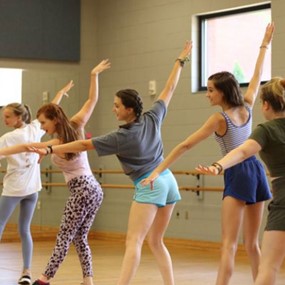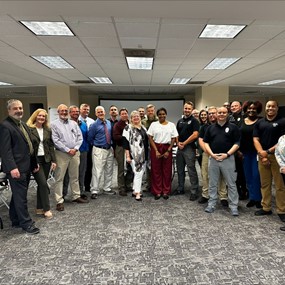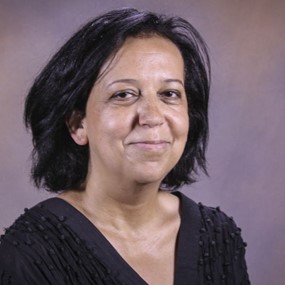Founding family: Terrance Vickerstaff traces roots to the beginning of Auburn
The Caroline Marshall Draughon Center for the Arts and Humanities welcomed Terrance Vickerstaff, family historian and first Pebble Hill scholar-in-residence, to the newly established Lowrey Guest House this spring. Vickerstaff is the first member of his family to stay on the property since his ancestors were enslaved to the original owners of Pebble Hill.
Vickerstaff shared the story of his family’s enslavement, freedom and lives in Auburn throughout time.
“As long as I tell the story, they won’t ever die,” Vickerstaff said. “I have a feeling that I’m carrying something that’s a jewel, and it is mine to handle it very preciously. It is mine to hand it off to those that will know how to handle it and to ensure that someone knows the story.”
Vickerstaff’s great-great-great grandmother, Betsy Scott Harper, was enslaved to Col. Nathaniel Jackson Scott, who helped build Auburn as we know it today in the mid-1830s and was the original owner of Pebble Hill. Betsy married Major Harper, who was enslaved to Judge Jackson Harper, the founder of Auburn, and they had 10 children together.
One of the many horrors and uncertainties of slavery came when an enslaver died, as enslaved people were considered property and often broken up among surviving members of the enslaver’s family. By the time Scott died, he was in debt and the judge waited to liquidate the estate after the Civil War ended and the Emancipation Proclamation freed Scott’s enslaved people. Betsy and Major were able to stay together, and since their time, nine generations of their family have called Auburn home.
Today, Vickerstaff shares his family history with students to teach about slavery, emancipation, reconstruction and local history.
“It’s not just that of a family story. It’s a story of many families,” Vickerstaff said. “It’s a story of a Black community that was strong here in Auburn after the Civil War, during Reconstruction, during the early 20th century on up through now; being able to remind not only schoolchildren, but even their parents and their teachers of the rich history that’s right here in Auburn.”
As part of the Teaching Pebble Hill lesson plan program, Vickerstaff taught Yarbrough Elementary School 4th-graders the importance of history by allowing them to travel back in time. Vickerstaff said connecting their lived experience to the lives of those who came before them helps make it “real.”
Vickerstaff said the content is not watered-down but explores big ideas through the lens of everyday life, to help children understand and be inspired by history.
“You want them to be little investigators, to know more not only about themselves but the family they’re a part of and the community that they live in,” Vickerstaff said. “Helping to create a story behind it creates context so they can connect to it. It’s important that we do that with those heavy subjects so that as they’re growing and dealing with more heavy subjects, they can carry it with them.”
By introducing those stories to the curriculum early, Vickerstaff said, local history blends itself with the topics schoolchildren are learning. When their history material is connected to a place they know or a person they’ve met, they are better prepared to curate and carry those stories throughout their lives.
“We carry these stories whether we want to or not,” Vickerstaff said. “They’re in our DNA; they’re in our lived experiences, and now helping to have a better understanding about who they are as they live into their growing up as a fourth grader, as a high school student or a student at Auburn University.”
Vickerstaff also noted the important work happening at Auburn University to ensure those stories are known, including Research to Preserve African American Stories and Traditions in the College of Human Sciences and seminars exploring placemaking through storytelling at the Baptist Hill Cemetery in the College of Architecture, Design and Construction.
As the first guest at the Lowrey House, a guest residence on the grounds of Pebble Hill, Vickerstaff returned to a place his ancestors called home more than 175 years ago. He said the experience was an honor that made him remember those who waited and prayed for freedom.
“What would Grandma Bess and what would Mama Betsy, what would Papa Major think about me being here today?” Vickerstaff said. “I think they would be extremely happy that a son that was born in freedom, who had opportunities that they have not had, never knew existed, is now back in a space that they were property and inventory in. I could hear whispers in my ear last night: ‘You're back, and you're the one that was supposed to come back.’”
Find more information about the Caroline Marshall Draughon Center for the Arts and Humanities in the College of Liberal Arts.
Tags: Community, Outreach and Engagement Center for the Arts and Humanities






